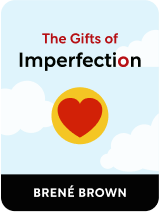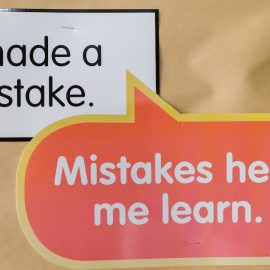

This article is an excerpt from the Shortform book guide to "The Gifts of Imperfection" by Brené Brown. Shortform has the world's best summaries and analyses of books you should be reading.
Like this article? Sign up for a free trial here .
Why does Brené Brown say it’s so important to follow your intuition? What are some barriers to trusting intuition? Can they be overcome?
Brené Brown’s guidepost #5 from The Gifts of Imperfection says that you need to follow your intuition to live Wholeheartedly. This can be difficult for many because the brain has an overwhelming need for certainty rather than instinct.
Here’s why Brené Brown says you need to follow your intuition.
Following Intuition
The fifth guidepost for living Wholeheartedly is to follow your intuition. When you use intuition, your brain uses information from your past experiences to quickly and unconsciously attach meaning to something you’ve just observed.
The meaning that your brain decides upon when using intuition becomes your “gut feeling” about the situation. A “gut feeling” can take two forms. It can be confidently and instinctively making a judgment about a situation—for instance, knowing the best way forward based on your previous experiences. Or, it can be recognizing that you don’t know enough about a situation to successfully judge what to do and that you need to seek more information.
For example, imagine you observe someone being rude to your friend. Your mind will quickly scan through all of the information it has relating to rudeness and acceptable standards of behavior. In the past, you’ve learned that rudeness is hurtful to its target, and is generally socially unacceptable. Based on this information, your brain will attach the following gut feeling to the situation: that your friend is being mistreated and that you should support them.
Being willing to use your intuition is a crucial part of living Wholeheartedly. Believing that you can make good decisions, even unconsciously through your intuition, will increase your worthiness. Decision-making will become an area in which you feel you’re “good enough.”
Barriers to Using Intuition
Following your intuition may seem like a straightforward enough process. After all, it’s usually unconscious, and you’re probably already doing it automatically. However, many of us struggle to follow intuition successfully. Often, this is because we’re wary of accepting our gut feelings.
This wariness comes from the brain’s overwhelming need for certainty. Humans love guarantees. We crave the feeling of being certain that we’re making the right choice. Unfortunately, intuition doesn’t always provide this kind of certainty.
Because intuition is a predominantly unconscious process, you often have no way of knowing what information your “gut feeling” is based on. Therefore, you have no way of evaluating the validity of this feeling. You can’t be certain that it or the information it’s based on is correct. This lack of certainty may make you refuse to trust your “gut feeling.” You might decide to look for answers elsewhere instead—for example, ask other people what they think about the situation.
Overcoming the Need for Certainty
To trust your “gut feelings,” you need to overcome the need for certainty. According to Brown, the key to doing this is embracing faith.
Faith is a form of courage. It requires you to let go of your fear of uncertainty and decide that even though you can’t be sure what’s ahead, you’re going to move forward anyway. You’re willing to take the risk that your intuition is wrong because you’re also willing to dream that it’s right. You believe in your ability to make good decisions. Ultimately, you trust yourself.
Faith requires you to trust your way forward even if there’s not enough evidence to be sure that this approach is correct. This may be an uncomfortable prospect if you have an evidence-based way of looking at the world. However, Brown argues that you need to make room for faith in your life no matter how uncomfortable it makes you. If you don’t, you’ll never develop the worthiness that comes from trusting yourself to instinctively make good decisions.
(Shortform note: For more on how intuition can affect decision making, read our summary of Malcolm Gladwell’s Blink.)

———End of Preview———
Like what you just read? Read the rest of the world's best book summary and analysis of Brené Brown's "The Gifts of Imperfection" at Shortform .
Here's what you'll find in our full The Gifts of Imperfection summary :
- How to stop feeling like you're not "good enough"
- How shame affects your self-worth
- The 10 guideposts to living Wholeheartedly and cultivating worthiness






